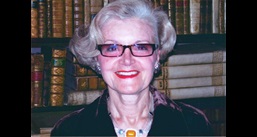The American Society of Hematology Honors Accomplishments of Thalia Papayannopoulou, MD, with Wallace H. Coulter Award for Lifetime Achievement in Hematology

The American Society of Hematology (ASH) will recognize Thalia Papayannopoulou, MD, of the University of Washington in Seattle with the 2016 Wallace H. Coulter Award for Lifetime Achievement in Hematology. Dr. Papayannopoulou will be honored for her innovative contributions to cutting-edge areas of hematology, including hemoglobin regulation and stem cell biology, her commitment to patient care, and her mentorship of several generations of hematologists during her 55-year career.
The Wallace H. Coulter Award for Lifetime Achievement in Hematology, the Society’s highest honor, is named after the late Wallace Coulter. Mr. Coulter was a prolific inventor and engineer, best known for developing the Coulter Principle, a method that revolutionized the use of basic blood tests to screen for disease. This award commemorates Mr. Coulter’s innovative spirit, visionary leadership, and entrepreneurship, and it is bestowed on an individual who has demonstrated lifetime achievement and leadership in education, research, mentoring, and practice. ASH President Charles S. Abrams, MD, of the University of Pennsylvania will present Dr. Papayannopoulou with her award on Sunday, December 4, during the 58th ASH Annual Meeting and Exposition in San Diego.
Dr. Papayannopoulou’s scientific contributions to hematology are plentiful. Among them, she presented original and insightful work on globin regulation and on the role of integrins on stem cell behavior and trafficking. She first described the activation of fetal globin in adult cells in vitro and in vivo under acute stress conditions or during post chemotherapy treatments, paving the way for further exploration of modalities for awakening fetal globin for therapeutic benefit in beta globin disorders. Dr. Papayannopoulou also explored globin regulation during development and in mutations leading to increased fetal globin in adult life.
She also demonstrated that beta 1 integrins or VLA4 are mechanistically important for stem/progenitor cell retention in bone marrow and for erythroid expansion and terminal maturation under stress conditions.
In addition to her numerous scientific contributions, Dr. Papayannopoulou has mentored generations of trainees and junior faculty on hematology, many of whom have become major leaders in the field. She has demonstrated leadership that has guided scientific exploration, and she has developed fundamental policies that have had a broad impact across hematology practices.
Dr. Papayannopoulou is an active member of ASH and other societies, including the American Society for Clinical Investigation, Association of American Physicians, International Society for Experimental Hematology (ISEH), International Society for Stem Cell Research, and she is a member of the American Academy of Arts and Sciences. She is the recipient of many prestigious awards and has served as a member or chair of several ASH committees. She also served on numerous editorial boards, including for Blood, the American Journal of Hematology, and The Journal of Clinical Investigation. Her most distinguished awards include ASH’s William Dameshek Prize (in 1990 with her husband, George Stamatoyannopoulos, MD, DrSci), Temple University’s Gwendolyn J. Stewart Memorial Award to honor women in the biomedical sciences, the Hellenic Society of Hematology’s Outstanding Lifetime Achievement Award in Hematology, and the Metcalf Award by ISEH.
“Dr. Papayannopoulou is a role model, not only because she is an accomplished scientist and strong mentor, but also because she started her career when the barriers for women in academic medicine were formidable, and she overcame these challenges to excel at the highest of levels,” said Dr. Abrams. “Dr. Papayannopoulou is known for her commitment and leadership in hematology. Her passion for the field is evident in the many outstanding hematologists she has mentored, and I am pleased to recognize her as the recipient of the Society’s highest honor.”
The American Society of Hematology (www.hematology.org) is the world’s largest professional society concerned with the causes and treatment of blood disorders. Its mission is to further the understanding, diagnosis, treatment, and prevention of disorders affecting blood, bone marrow, and the immunologic, hemostatic, and vascular systems by promoting research, clinical care, education, training, and advocacy in hematology. The official journal of ASH is Blood (www.bloodjournal.org), the most cited peer-reviewed publication in the field, which is available weekly in print and online.
CONTACT:
Sara Khalaf, American Society of Hematology
[email protected]; 202-552-492